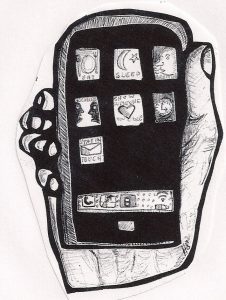NOTE: Nothing in this blog is intended to diagnose, treat, prevent, or cure illness. This blog is one woman’s opinion, and my opinions are constantly evoluting as I grow, learn, experience, and change my mind.
People need help.
The Buddha wasn’t wrong: this world is a vale of tears. The inevitability of loss stalks us throughout our lives, as does the essential loneliness of the human condition. Even love, which I see as Divine, sometimes connects us one to another only tenuously, through pain and suffering, isolation and despair. This doesn’t take into account the deeper, more profound, organic ills, the schizophrenias, manic depressions, psychotic breaks from reality, criminal psychopathy, and so on.
I simply do not see contemporary talk psychotherapy as the answer.
For one, it takes too long. For two, there’s brain scan evidence that it re-traumatizes the brain. For three, too much talk therapy arises out of a relativistic paradigm where proactive personal honor and the hard work of integrity are not valued; it’s all about what Caroline Myss calls ‘woundology.’ It’s about making excuses and prolonging self-pity. It is disempowering. Four, too much psychotherapy is anti-spiritual, and so the therapy is powered by only 1 horse out of the available 1,000,000 that come with a sense of the larger wonder and mystery that is the Source of everything. Five, plenty of psychotherapists and psychiatrists are loony.
But people need help. We all do, at some point in our lives.
Fortunately, there are alternatives. Here are some that I’ve discovered along the way.
First, because I am a healer and I have seen with my own eyes the dramatic positive shifts people can make with hands-on or spiritual healing, I recommend that people investigate Barbara Brennan Healing science, reiki, and therapeutic touch.
The energetic modalities work because we are more than mechanistic organic beings. We have an X factor: consciousness. Consciousness is always in dynamic interplay with matter. The new physics explores this, by noting that the observer always influences the outcome of the experiment.
Consciousness makes an impact on the physical world. And as best we can tell with the science we have right now, consciousness can be better described by a vibratory wave model of energy-matter than by the old Newtonian model of the body (and the universe) as a grand machine. That is, as Richard Gerber writes in VIBRATIONAL MEDICINE: New Choices for Healing Ourselves,
“The Einsteinian paradigm as applied to vibrational medicine sees human beings as networks of complex energy fields that interface with physical/cellular systems. Vibrational medicine uses specialized forms of energy to positively affect those energetic systems that may be out of balance due to disease states. By rebalancing the energy fields that help to regulate cellular physiology, vibrational healers attempt to restore order from a higher level of human functioning.”
Gerber’s book is fascinating and explains the underpinnings of what he calls ‘vibrational medicine.’ I see it as why Reich was right, and Freud erred. Reich was trying to get to the energetic core of psychological disease. Reich wanted to treat the root, not the symptom. So he devised the orgone box for people to sit in so they could be charged up with healing energy.
Pierrakos’ work in Core Energetics comes out of Reich’s work, and Core Energetics is an efficacious modality. It works good. It sees the human being as a psychosomatic unity: body-mind-spirit-psyche are one indivisible unit. Affect the body, and the mind, psyche, and spirit are affected. Affect the psyche, and the mind, body, and spirit are changed. There is no extricating out one strand of the multifarious beings that we are! We are whole even when we have forgotten that.
And take a look at Hellinger’s Family Constellation work. It’s not widespread yet in the US but practitioners are around. In LOVE’S HIDDEN SYMMETRY: What Makes Love Work in Relationships, Hellinger and his co-authors write about the Greater Order of Love. “If you want love to flourish, you need to do what it demands and to refrain from doing what harms it. Love follows the hidden order of the Greater Soul.”
Hellinger approaches whole person healing from an energy systems viewpoint, from an understanding of conscience and balance in giving and taking, forgiveness and reconciliation, the systemic conscience of the greater whole, and the orders of love within the family. Fascinating, useful work. Personal story, that is, the drama of all the wrongs suffered since birth, is not encouraged. Hellinger is on to something, and people who do the family constellation work find resolution, greater wholeness, and greater peace.
EMDR, thought field therapy, and emotional freedom technique are essential tools for healing. EMDR makes use of the intense eye-brain connection; TFT and EFT have a foundation in the ancient system of energy meridians that run through the body and that connect body with mind through consciousness. I have personally experienced powerful, fast improvements using EFT. Take a look at the website emofree.com and at Maggie Phillip’s book FINDING THE ENERGY TO HEAL: How EMDR, Hypnosis, TFT, Imagery and Body-Focused Therapy Can Help Restore Mindbody Health.
Vitamins and herbal supplements are worth exploring. There’s a lot of research done regarding fish oil supplements and how they enhance brain function. I’ve read that magnesium can help with anxiety. In Europe, St. John’s wort is often prescribed for depression, and it has fewer side effects but is just as effective as the common psychopharmaceuticals.
When I was in college, I had a lot of mood swings and dark moods, and I felt as if I were at their mercy. Those were alleviated radically when I did two things in grad school: 1, went off birth control pills, and 2, exercised vigorously and regularly. Running and lifting weights got my blood pumping. They also sculpted my body, which gave me feelings of accomplishment and self-esteem. Plus, they were just fun!
During my divorce, a time which was heart-wrenchingly painful and sad for me, I started doing yoga regularly. I can’t say enough positive things about yoga. It’s magical. It’s miraculous. Everyone should do yoga, (as long as your doctor agrees). One friend dismissed yoga by saying, “Oh, it soothes the mental body.” But, as I have always found, the mind and the psyche are completely interwoven! Anything like yoga that has such a profound and positive effect on my mental body, and a strengthening and limbering effect on my physical body, can only help my psychological body!
To feel good emotionally, it really helps to have the body feel good. So: eat good food. A chocolate bar here and there isn’t going to condemn you to depression. But, in general, eat food that remembers where it came from. Eat lots of salads, greens, veggies, and fruit. Eat whole grains and lean meats.
In my opinion, everyone should avoid highly processed foods, high fructose corn syrup, and additives like MSG. People with autistic children are starting to get the word out that a wholesome diet has a profound affect on those children. See Jenny McCarthy’s website generationrescue.org. I suspect that the American diet of high fructose corn syrup, sugar, caffeine, and diet soda is poisoning us into psychological and physical illness and obesity–and the FDA is too compromised by industry and big pharma to tell us that truth.
So: here are some recommendations for where to get started with alternatives. This is not a comprehensive list. Send me others; I’ll revisit this topic.





